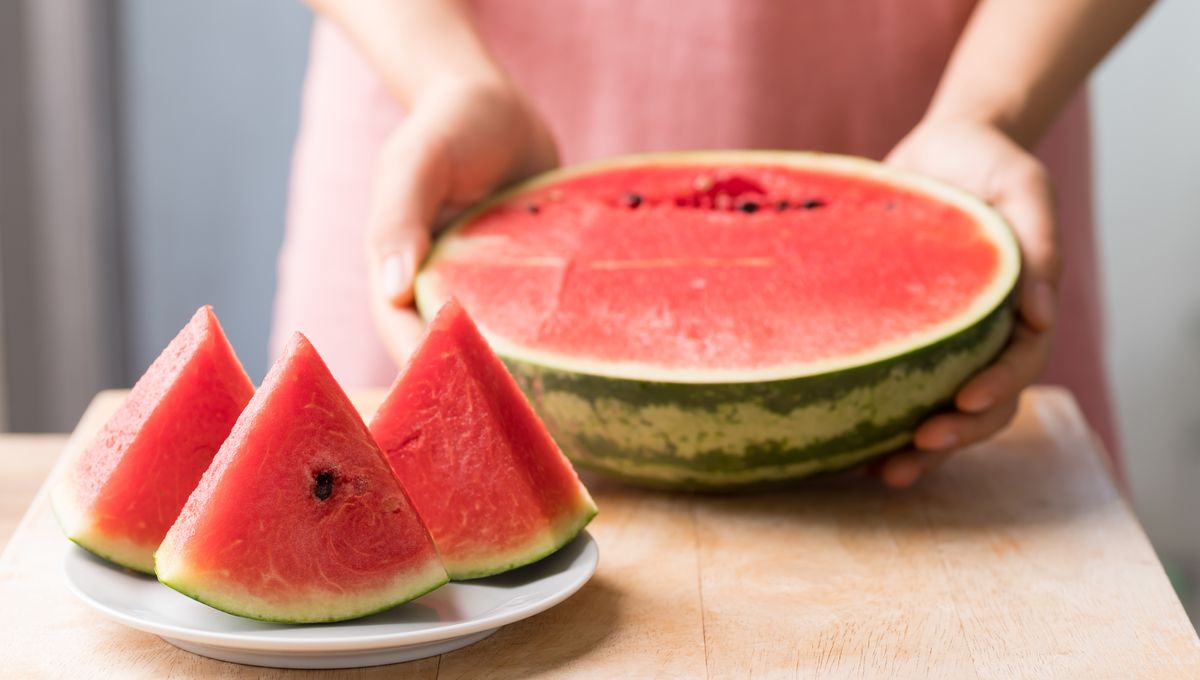
Chomping into a big ol’ hunk of watermelon is a rite of passage into the summer months for some of us, but for people with chronic kidney disease (CKD), too much can actually end up being dangerous.
That was the case for three patients with CKD featured in a new case study, who ended up falling severely ill after eating excess amounts of watermelon – but why did they end up needing medical attention?
The answer lies in that there’s more to watermelon than just, well, water. This juicy fruit is packed full of full of vitamins and minerals, the most dominant of which is potassium. A single wedge of watermelon (roughly 286 grams or 10 ounces) contains 320 milligrams (0.01 ounces) of potassium, which is about 12 percent the recommended daily intake for women and around 9 percent for men.
For the average healthy person, watermelon therefore makes a plentiful (and delicious) source of potassium, which is handy considering its many roles within the body. It’s used by our nerves to help transmit signals, including those that cause muscle contraction, in maintaining normal fluid levels outside our cells, and in keeping blood pressure in check.
Under normal circumstances, excess potassium not used in these processes is removed by the kidneys and comes out in the urine. However, for people with CKD, the kidneys aren’t quite so efficient at filtering potassium out.
This meant that for the three patients in the case study, eating too much potassium-rich watermelon resulted in them developing severe hyperkalemia, a condition in which there’s too much potassium in the blood.
The patients had between 6.6 to 7.4 millimoles per liter of potassium in their blood – the normal range is between 3.5 to 5.0 mmol/L. All three had been consuming large amounts of watermelon – either as is or in juice form – every day for three weeks up to two months.
Though the patients were seen by healthcare professionals, hyperkalemia doesn’t always result in obvious symptoms, as was the case for one of the three patients. However, it can also have some pretty serious ones.
The two other patients, for example, presented with heart problems that were attributed to excess potassium; one had a slower than normal heart rate and the second had received a shock from a defibrillator implant designed to restore regular heart rhythm.
Other symptoms can include muscle weakness, tingling sensations, nausea, and in sudden or severe cases, shortness of breath and chest pain.
Thankfully, even though it can be serious, hyperkalemia can be treated. In the case of the study patients, their immediate treatment involved medication, but it was also recommended that they all reduce their watermelon intake. Follow up a few months later revealed that all had done so and consequently, their potassium levels had returned back to normal.
The authors of the case study hope that it’ll bring awareness to the little-known dangers of eating too much watermelon for people with CKD.
“Watermelon is a popular summer fruit and although bananas, potatoes, and tomatoes are notorious for causing hyperkalemia, the risk for hyperkalemia after excessive watermelon consumption often is overlooked,” they write.
“Recognizing the cause(s) of hyperkalemia are pivotal in treatment and for prevention of future episodes.”
The study is published in Annals of Internal Medicine: Clinical Cases.
Source Link: Overdosing On Watermelon Is A Real Possibility For People With Chronic Kidney Disease